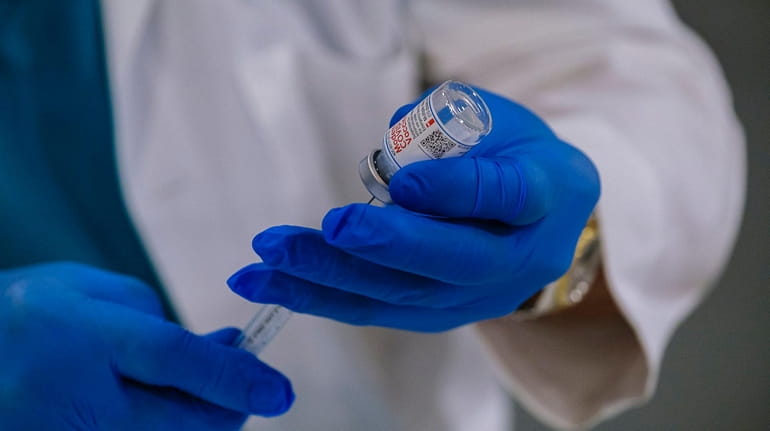Clearing up myths, misconceptions about coronavirus vaccine

A doctor prepares a dose of COVID vaccine on Jan. 11 at the NYPD Police Academy in College Point, Queens. Credit: Jeff Bachner
Myths and misconceptions about the coronavirus have permeated the pandemic since the first cases of a mysterious severe acute respiratory syndrome emerged in the Chinese city of Wuhan in late 2019.
Now, more than a year later, there is a new round of misconceptions and misinformation surrounding the vaccination. Here are the facts.
If everyone got infected, wouldn't humans develop herd immunity naturally, without the need for a vaccine?
If everyone got infected, wouldn't humans develop herd immunity naturally, without the need for a vaccine?
Even if most people survive a COVID-19 infection, people in vulnerable groups — the elderly, the immunocompromised — are especially susceptible to dangerous bouts of and death from the virus, according to the U.S. Centers for Disease Control and Prevention.
Despite more than a year of clinicians perfecting treatments for COVID-19 — less use of ventilators, monoclonal antibodies, corticosteroids, a technique called "proning" — the death toll in America hovers around 4,000 some days.
As so many people get infected that hospitals are overflowing in pockets of the country, and long-term side effects of the virus are unknown. As Dr. Jay Varma, New York City’s special adviser for the pandemic, said, the more people who are sickened with the virus, the more likely it is that the virus will mutate: "dogs bark, ducks quack, viruses mutate. That’s what viruses do."
Once vaccinated, aren't we free from taking precautions such as wearing face masks and practicing social distance?
Once vaccinated, aren't we free from taking precautions such as wearing face masks and practicing social distance?
No, even if the vaccination confers the full, expected protection from the coronavirus — it is about 95% effective, according to the National Institutes of Health — it’s unknown whether vaccinated people, even without being symptomatic themselves, can still carry the virus and infect others, according to a publication from the Columbia, Weill Cornell and NewYork-Presbyterian health systems.
Wearing a face mask traps virus particles, and social distancing reduces the chance that breathing, sneezing or talking will transmit the virus. And in the single-digit chance the vaccine isn’t effective for an individual, mitigation measures like masks and distance can help protect all involved.
Isn't the vaccine unnecessary for people who have already recovered from COVID-19?
Isn't the vaccine unnecessary for people who have already recovered from COVID-19?
Although a study published Jan. 6 in the journal Science found up to eight months of immunity following the onset of COVID-19 symptoms, there isn’t a clear answer yet on how long natural immunity lasts, or how strong the immunity is that’s conferred, according to the CDC. So getting vaccinated is still important in the long term. The CDC says in guidelines updated Jan. 6 that you may delay being vaccinated until about 90 days following a diagnosis of COVID-19.
Don't the vaccines alter human DNA?
Don't the vaccines alter human DNA?
No, the technology in the two vaccines approved in the United States, by the pharmaceutical companies Pfizer and Moderna, work by injecting mRNA, a molecular road map, to prompt the body’s production of coronas — spiked proteins — similar to the kind the virus uses to attach to human cells. So the body learns what to look out for if exposed in the future to the actual virus and its spikes.
The injection of mRNA does not, however, interact with cells’ DNA, according to the CDC. The human body breaks down and gets rid of the mRNA once its work is done, the CDC says.
Is it true that the COVID-19 vaccines contain an injected microchip tracker that could monitor people?
Is it true that the COVID-19 vaccines contain an injected microchip tracker that could monitor people?
The vaccine doesn’t track anyone. It had no microchip component and no information is transmitted from the body into a database. That myth may have come from remarks by Bill Gates discussing a digital way to track such things as who had recovered from the virus and who had been tested. But Gates made no mention of a microchip for the body, and in fact denies that's what he was referring to, and there is no such technology in the vaccine.
Isn’t everyone at equal risk of getting the coronavirus, regardless of blood type?
Isn’t everyone at equal risk of getting the coronavirus, regardless of blood type?
For reasons that aren’t completely yet understood, those with Type O and rhesus negative (Rh-) blood might have a lesser chance of becoming infected with COVID-19, per a study in the Annals of Internal Medicine published late last year. The study also found that those groups are less likely to develop a serious case of the disease.
Dr. Leonard Krilov, chairman of pediatrics and chief of pediatric infectious disease at NYU Langone Hospital-Long Island, told Newsday: "We don’t yet know why, but statistically those with Type O blood are experiencing less severe cases of COVID disease. We suspect it could be that there are different antibodies associated with different blood types. Type A and Type AB are seeing higher correlations to more severe cases of the disease."
Is fertility affected by the vaccine?
Is fertility affected by the vaccine?
According to the Harvard University Medical School and other medical experts, the COVID-19 vaccine is not believed to affect fertility. The virus itself may affect male fertility, according to government studies, and the infection could affect mother and offspring.
Dr. Nicolas Hernandez, Northwell Plainview Hospital academic hospitalist, told a Newsday panel that the vaccine is unlikely to cause infertility but more data will need to be compiled to be sure. Other doctors on the panel said it didn't make sense that infertility could be a vaccine side effect.
Are pregnancy and breastfeeding impacted by the vaccination?
Are pregnancy and breastfeeding impacted by the vaccination?
Vaccination should be offered to pregnant and breastfeeding women, according to the Centers for Disease Control and Prevention, the Society for Maternal-Fetal Medicine and the American College of Obstetrics and Gynecology. Still, while the vaccination poses no known risks, the impact on women who are pregnant or breastfeeding hasn’t been thoroughly studied.
However, according to the Harvard Medical School: "The immunity that a pregnant individual generates from vaccination can cross the placenta, and may help to keep the baby safe after birth."
Is it true eating burnt orange peel can help restore sense of smell after having the virus?
Is it true eating burnt orange peel can help restore sense of smell after having the virus?
Pamela Dalton, a researcher at the Monell Chemical Senses Center in Philadelphia, told NBC's "Today" show, and later reported in USA Today, that any restoration claimed on social media like TikTok due to a burned orange had probably been from people who were already getting the sense of smell back but didn’t notice it yet.
Sign up for COVID-19 text alerts at newsday.com/text.

